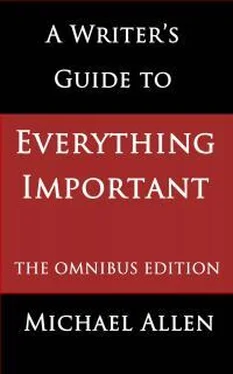Strange how reluctant these agent guys are to let you go when you’re making money, isn’t it? Whereas, if you’re just starting out, you’re lucky if you can get them to read a three-line letter.
Robert Gottlieb, by the way, the co-founder and Chairman of TMG, started the agency in 2000 after 24 years at the William Morris Agency, which is about as big a name as any. His clients have included Tom Clancy and Dean Koontz.
When this situation was reported on the Passive Voice blog, one comment came from a writer who said that he had recently been offered representation by a large NY agency, and the contract between writer and agent wasn’t terminable at all, once signed. Not ever. Not even for unsold rights. Needless to say, the commenter added, he did not sign, ‘but there are plenty of authors who have.’
3.5 The Agent as White Knight
So far in Part 3 I have presented a portrait of various agents as hard-nosed bastards who were, if not exactly crooks, then very definitely a bit on the dodgy side. They were, to quote Stephen King, the kind of people ‘who would steal the pennies off a dead man’s eyes’.
However, let us lean over backwards to be fair. Can we, do you think, find an agent who went out of his way to help an innocent lady client? An agent who saw all too clearly how his client had been given the old run-around, to her very definite disadvantage, and who went to some trouble to put things right?
Yes, indeed we can. His name is Arthur Klebanoff, and the incident is described in his 2002 book The Agent.
Once upon a time there was a very successful English romantic novelist named Anne Hampson. In the early part of her career, Anne was published by the English firm which was then known as Mills & Boon. In the UK, the name Mills & Boon is virtually synonymous with popular romantic fiction.
From 1971, however, Mills & Boon had technically been a subsidiary of Harlequin, a powerful North-American company which had its head office in Canada and another subsidiary in the United States.
In the early part of her career, Anne Hampson had operated without the benefit of an agent, but in the 1980s, with 100 novels behind her, she thought it was time to appoint one. So she chose the powerful New York firm of Morton Janklow Associates. The agent within that firm who looked after her interests was Arthur Klebanoff.
Given that Anne was a well established writer in the romance field, and was particularly popular in America, Klebanoff soon negotiated a new contract for her. The deal was done with Silhouette, an American firm, and the contract was for more than twenty books and $1 million.
Having arranged a very satisfactory contract for Anne’s future books, Klebanoff then began to look at her previous work, which had all been published by the London subsidiary of Harlequin, i.e. Mills & Boon – a firm which I shall refer to from here on as M&B.
When Klebanoff looked at Anne’s previous contracts with M&B he was shocked by what he saw. To cut a long story short, he found that this original publisher had offered his writer a series of contracts which were, shall we say, less favourable to the author than they might have been.
What was happening was that M&B had offered Anne a contract for world rights – a very common practice. M&B had then sold the rights to her books to their parent company, in Canada, which then sold the US rights to their American subsidiary.
At each stage of this transfer process, the companies had taken a slice of the action. In other words, for every dollar which Anne earned on royalties in the US, 75 cents were removed and retained by the two companies outside London. And, since the average print run for an Anne Hampson novel, in the US market, was 750,000, this amounted to a considerable sum. On each book. And she had published 100 of them.
This practice of passing the rights from company to company was, in Klebanoff’s view, entirely unnecessary. (That’s my view too.) It was certainly damaging to his client’s financial interests.
Clearly, the sole purpose of this elaborate game of pass-the-parcel was to increase the amount of income from Anne Hampson’s books which could be retained within the Harlequin group of companies, instead of being paid to the author. There was nothing illegal about it, but some observers might feel that it was the moral equivalent of stealing money from an old lady. It certainly wasn’t a gentlemanly approach.
None of this arrangement, needless to say, had ever been explained Anne Hampson herself. It took an experienced man, with a good head for figures, to go through the contracts and the royalty statements and work out the figures.
Once Klebanoff had a clear picture of what had been going on, he took action to obtain compensation for his client.
In his book, Klebanoff does not give us much detail of his discussions with M&B and its parent company. However, my guess is that, being a New Yorker, he used some pretty blunt language.
First, he would have told M&B that he was wise to what they were up to. Second, he would have pointed out that the contracts gave the author the right to examine the publisher’s books in respect of her royalties. Third, he would have made it clear that, unless they came up with a considerable sum of money by way of compensation, he would not only send in a team of auditors, but would also make it generally known in the book trade that he was having the books examined, and why. If the word of that spread, it would not be long before other agents in London also wised up to the situation, and sent in their own teams of accountants to pore over the figures for their authors as well.
This was not a happy prospect for M&B, or Harlequin. It’s never nice being caught being nasty to old ladies.
Harlequin refused to meet Mr Klebanoff in New York, to discuss this situation. They refused, he believes, in order ‘to protect themselves, they hoped, from jurisdiction in the United States.’ So he flew to London to negotiate the details.
When he arrived, he found that the Harlequin representatives had been doing some fast thinking. They now claimed that they had ‘misunderstood’ his earlier conversations with them.
The meeting was over in no time and a face-saving deal was done. Anne Hampson would receive a large sum of money, but its purpose would be disguised. This was certainly not compensation for being cheated, and it definitely wasn’t hush money. Dear me no. No, this payment was dressed up as the purchase price for the copyright of 92 of Anne Hampson’s books which had been published by M&B. The price paid was in seven figures. i.e. in excess of $1 million.
Through this deal, as Klebanoff explains, ‘Harlequin avoided the accounting issue and the risk that other authors would focus on these practices.’
In other words, it was tacitly understood that Klebanoff would not make it his business to inform every other M&B author of what he had managed to negotiate, and why. (Not until he came to write his memoirs, anyway. Further details of these negotiations can be found in The Agent .)
This story leaves a particularly unpleasant taste in my mouth because I know that M&B went out of its way to make its most popular authors feel that they were highly valued and well treated.
Every Christmas the bestselling ladies would be sent a couple of bottles of something bubbly. Once a year they would receive a first-class return train ticket to London. On arrival, they would be warmly welcomed and taken to lunch at the Savoy Grill, or somewhere equally fashionable – a place where you might find Elizabeth Taylor at the next table. And then, as they were put back on the train home, they would have an enormous bunch of flowers thrust into their arms.
The ladies treated in this way would settle back in their seats with a nice warm feeling inside.
Читать дальше












